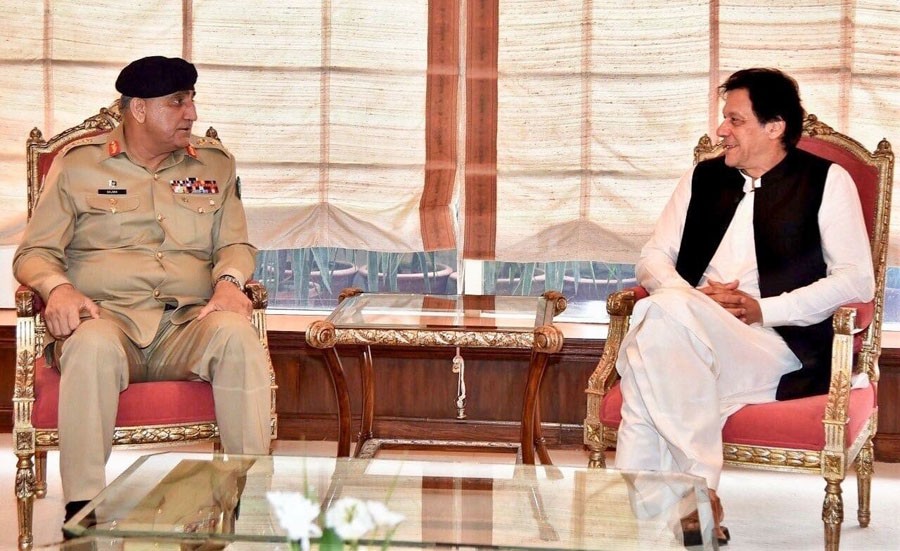
How can we clear the space for civilian democracy to embed itself?

There are two streams of critical opinion about the current democratic crisis. The first is that the establishment is habitually crushing all forms of democratic dissent and has selected the PTI to revoke the charter of democracy. The other view is that civil society has failed to resist the shrinking of democracy in Pakistan. Apart from a governmental purge of NGO projects, activist groups are also split by the widest generational gap than ever before.
Both views are accurate but how did we get to this point and can resistance politics for democratic ends be revived?
The military’s use of religious meddlers as proxies is historic. Recently, this axis has shifted from foreign policy to a domestic tactic and taken the form of engineered dharnas led by Tahirul Qadri against the PPP government, and staged by Imran Khan and Khadim Rizvi against the PML-N government. PTI chose to ignore the script of this military-mullah plan in which they will be the next confirmed target.
Meanwhile, the corruption narrative against the opposition parties is a tiresome deflection from the obvious confusion, contradictions, hypocrisy and fake news promoted by the PTI leadership. The overall dumbing down of political discourse is clear when economic misinformation, tried and failed poverty alleviation policies, and back-tracking on human rights issues are reinterpreted by Imran Khan’s worshippers as ‘original’ and moral virtues.
The PTI apologists suffer from the ‘it’s my perception and therefore, my fact’ syndrome. Some even claim that we are already post corruption because they got upgraded for free on a PIA flight since business class privileges have been revoked for government officials. Such illogic confirms how the post-factual works, just like in Trump’s America. These decoys help the establishment that is invested in pitting civilian versus civilian in order to undermine democratic politics. The PTI cannot grasp the importance of rising above their vengeance mania and getting on the same page with parliamentary parties, not the judiciary or military.
In Gen Musharraf’s time, resistance was stifled because progressives and conservatives were enabling rather than opposing the military rule. Progressive groups were busy accusing each other of being pro-drone, state and military supporters or mocking the redundant left’s covert romance with the Taliban. Even the one nationwide mass resistance of the Lawyer’s Movement became subject to suspicion and cooptation. By the time Musharraf was extracted, activists became increasingly fragmented and dependent on social media and lost all influence over street political resistance.
In the post-Musharraf democratic interregnum, many of Gen Zia’s children channeled their activism into paid consultancies, the private media, or into a new profession called ‘the moderator’. The culture of resistance further eroded as literature and sponsored ‘festivals’ became narrow off-site stages for performing counter-cultural activism. The irony of this is lost, even as satire has become this generation’s favoured tool on the path of least resistance.
Gen Musharraf’s children meanwhile practice politics almost completely online. They are busy scoring rhetorical points in order to promote their own brand of activism and identity, independent of previous generations.
The success of organising resistance depends on collective decisions, methods and political memory. But this seems too slow and unexciting for the lofty mid-life activists who have over-analysed and are now comfortable mocking a metaphor from their armchairs. Meanwhile, the millennials are so paralysed with anxiety about ‘binaries’ while clueless about the state, that they never manage to take an actual stand as they frantically move from one single issue to the next with little progress. For a generation that has mastered the art of trolling, they are also surprisingly easily injured by any debate or criticism.
The chief justice is suffering dictator-envy, the military is protesting too much its undying love for democracy and the PM is egging to please them more than his voters. It cannot be reinforced enough that intentions and optics do not matter. The concept of individual messiahs is an authoritarian and unsustainable principle. The judiciary and military are firewalled from critique due to laws against contempt and treason but Parliament has in-built checks and balances that allow for criticism and accountability. These must be strengthened internally rather than bullying by other state pillars.
How can we clear the space for civilian democracy to embed itself? If secular resistance is the counter to religious bigotry; if feminism is the challenge to patriarchal practices; if collective action is the remedy to elite capture then; civilian cooperation and consensus is the only antidote to military hegemony, direct or otherwise.
The military and judiciary must be barred from constitutional violations and exclusively focus on their own institutions. Political parties and people’s groups must collaborate in a consultative process to strengthen democratic norms and progress. Concessions for economic blunders, excuses for absurd policies or dependence on reckless saviours are just gardening in the graveyard of democracy.